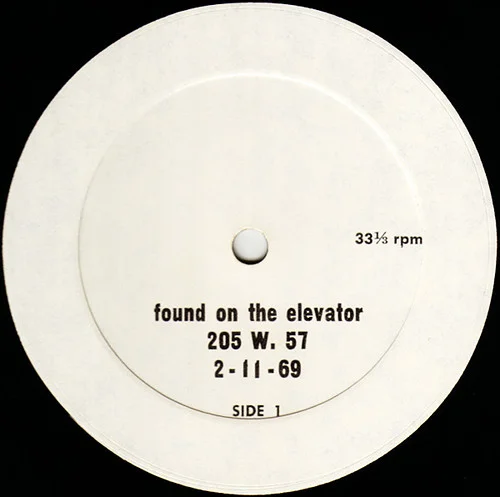Mad Audio Sci-Fi: Found on the Elevator
February 11th, 1969. The disc is 8½ inches in diameter. It's made of tough, plastic-like substance. Grooves like those on a sound recording spiral on both sides. There's no label, no center hole.
After some rigging with a record player, it turns out the disk is optimally played at around 20 revolutions per minute.
The needle crackles for a few seconds.
Then, a voice speaks in the fashion of explorers and scientists, unsure of the success of his venture:
"Testing, testing. Zero, zero, zero. Uh... Now that I have it leveled I don't know what to say. Um, this is an experiment, unauthorized."
Possibly the first found footage mystery, Found On The Elevator 205 W. 57 2/11/69 is an unique piece of science-fiction history, on par with Orson Welles's famous rendition of War of the Worlds, but infinitely more obscure. As the complicated title reveals, the disk was supposedly found on a New York elevator in 1969, without any clues to its author, purpose or origin.
"And if it's in error then nobody's hearing this anyway. I can see I should have prepped this better."
The disk includes the musings of Deckard, T.L., index J-3, CMR 00965 of T-Group Roaring Vectors 252, from the year 2058 CDS (Carbon Dating System). He is a cyborg gone rogue, doing an unauthorized experiment with a temporal interchange device, sending his message back in time to "approx. A.D. 1953" and suddenly finding himself at a loss for words at the prospect of communicating with the distant past. Deckard realizes that his communication is necessarily one-sided, but still wonders why no-one in his time has attempted a similar feat.
"My primary impulse now is to feed you questions, but that would yield zilch effectiveness under circumstances. Querie. Do you know of feedback from A.D. If so, utilize it. I have a definite positive impulse to touch with you. Meanwhile necessitates I give one blue verbal flow at which I function zilch and hope it receives. I can't believe this operation hasn't been performed before."
In the ten minutes of side A hearers learn that Deckard's world is somewhat uninformed of the 20th century, a time "[a]ll mechanical and disunified. Before major coordination. [...] All kind of physical, slow." He suffers from a faulty "number nine electrode", experiencing sharp flashes of pain in his frontal lobe that lead to "emotional regret" as he records his message. We get a sense of a transgressing individual, responding positively to the few rumors of our age due to insufficient "history infusions" and marveling at his "spontaneous action" to produce the recording - spontaneity apparently not being in vogue in 2058 CDS.
Apparently, the piece was written and recorded by Clark Gesner who sold 10" copies of the 'original' recording, but maintained that he merely acted as a proxy to those trying to make sense of the artefact and confirm its authenticity - especially one William Hofstadter, communications to whom were supposed to be directed to Gesner. (The same Mr. Gesner later wrote You're a Good Man, Charlie Brown, a musical adaptation of Charles M. Schultz's Peanuts!)
Such authorial speculation aside, everyone can let their imagination loose and maybe, just maybe, entertain the possibility that a sad, curious being from the future had something to say to us, his predecessors - even if he wasn't quite sure what that should be.
Hear for yourselves:
Found On The Elevator 205 W. 57 2/11/69, side 1
And read the rest.


